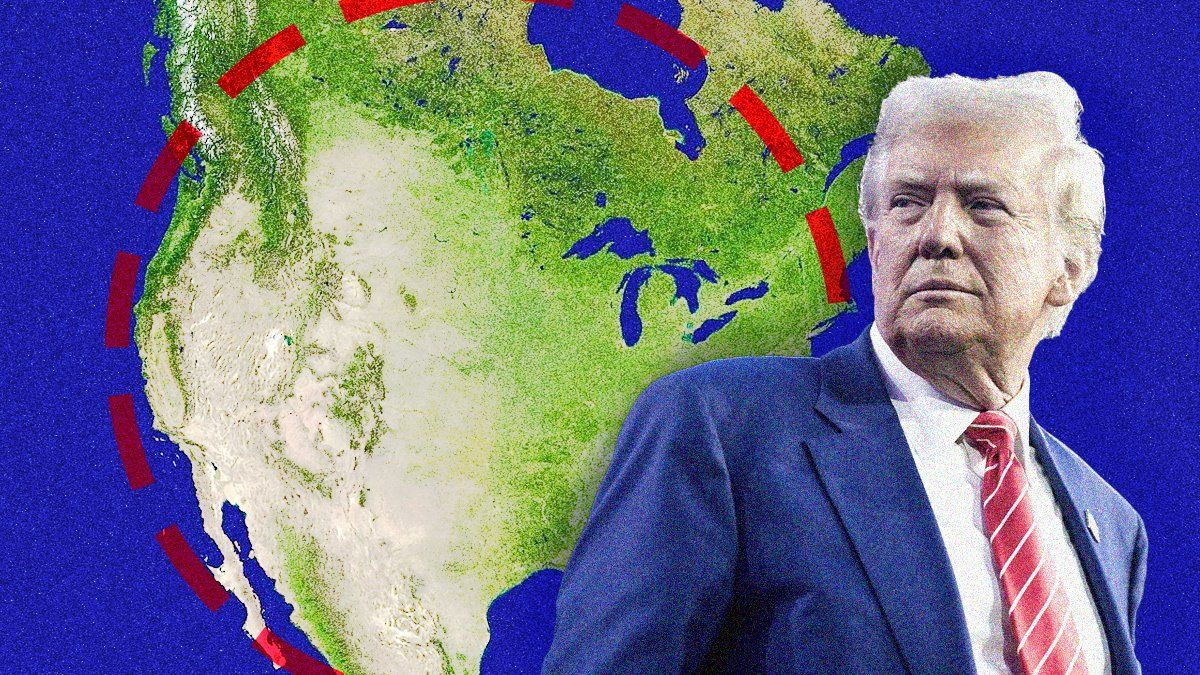It has been a long time since the United States got any bigger.
In the 19th century, the American governing class believed in Manifest Destiny — that the country should govern the whole continent, spreading democracy and capitalism — and the young republic acquired Alaska and much of Mexico. Recently, though, Americans have seemed happy with their territorial limits.
On Tuesday, Donald Trump signaled that this may be about to change. In a news conference at Mar-a-Lago, the soon-to-be president expressed the desire to acquire Greenland, reacquire the Panama Canal — by force, if necessary — and use “economic force” to acquire Canada.
Observers do not think he can seriously intend to absorb his northern neighbor, but it’s hard to be entirely confident.
Trump has been teasingly calling Justin Trudeau “governor” for weeks and cracking jokes about making Canada the 51st US state, but his tone on Tuesday was different. He sounded serious.
Trump referred to the Canada-US border as an “artificially drawn line” and complained about the cost of the relationship with the United States.
“We don’t need their cars,” he said. “You know, they make 20% of our cars. We don’t need that. I’d rather make them in Detroit. We don’t need their cars. We don’t need their lumber. We have massive fields of lumber. We don’t need their lumber. We don’t need their dairy products. We have more than they have.”
Trump said he would impose “very serious tariffs on Mexico and Canada,” and complained about drugs and migrants crossing both borders.
Since Trump first threatened to hit both countries with tariffs in November, Canadians have shown signs of distress. Premiers, fearing the impact on exports to the United States, have urged Ottawa to cooperate on the border, and Trudeau flew down to Mar-a-Lago to kick-start talks. Canada rushed to present a border plan. But even as they sought to placate Trump, the president-elect increased the intensity of his rhetoric.
Snowball’s chance …
After Tuesday’s news conference, Canadian leaders responded by telling Trump that Canada is not interested in joining the United States — an idea that is just not that popular.
“There isn’t a snowball’s chance in hell that Canada would become part of the United States,” Trudeau tweeted.
“Canada will never be the 51st state,” tweeted Conservative Leader Pierre Poilievre. “Period.”
“Cut the crap, Donald,” tweeted the NDP’s Jagmeet Singh. “No Canadian wants to join you.
Canadian commentators also expressed that they wereshocked and appalled by Trump’s suggestion.
South of the border, though, Trump’s supporters were cheering him on. Matt Walsh, Jack Posobiec, and Jesse Waters all want to conquer Canada.
It is hard to know how seriously to take any of this.
How serious is he?
Trump’s complaints about Canada seem manufactured. Little fentanyl comes across the northern border. The $100 billion trade deficit that Trump gripes about is largely the result of oil and gas exports, which help keep US gas prices low at the pumps. If the Americans don’t want it, Canada could find other markets. Imposing tariffs would wreck the Canadian economy, but it would also damage American interests, especially if Canada imposed retaliatory tariffs on, for example, Florida orange juice.
But some well-connected people are rattled by Trump’s talk. Could he plan to wreak havoc with the Canadian economy? Will he try to divide and conquer by offering oil-rich Alberta the chance to join its biggest market, creating a Donbas on the 49th parallel? Utah GOP Sen. Mike Lee joked that the United States might like to take Alberta and leave the rest.
But it doesn’t seem like the MAGA movement would want Canada. Its left-leaning voters would make it hard for any future Republican to win the presidency. English Canadians have been struggling to accommodate prickly French Canadians since the country was founded.
What does MAGA want? So this doesn’t look like a practical proposal, and in the same news conference, Trump sounded unhinged, opining that windmills are driving whales crazy, for example.
The best-informed observers doubt that he is serious about annexing Canada.
“I think he is rattling cages so that he can expand the boundary of acceptable outcomes,” says Eurasia Group Vice Chairman Gerald Butts, who, as a senior adviser to Trudeau, negotiated with Trump. “Something like, sorry we screwed up your auto industry and dairy market, but at least you still have a country.”
“Trump’s threats against Canada seem less than serious as of now, though his comments about Panama and Greenland should not be dismissed,” says Clayton Allen, Eurasia Group’s US director. “Those are a clear effort to expand the range of potential actions and have in-built strategic benefits which Trump or those in his orbit view seriously.”
“He’s negotiating like a real estate developer negotiates,” says Jamie Tronnes, executive director of the Center for North American Prosperity and Security. “He sees a bunch of land and thinks it would be really cool to have his name on it, but I don’t think that’s going to happen.”
“Trump is softening his targets up for negotiations to come,” says Graeme Thompson, a senior analyst with Eurasia Group. “He’s obviously serious about getting concessions on trade issues and the border, and he’s very happy to continue poking where he finds weakness.”
He has found it in Ottawa. Trudeau, who announced his resignation on Monday, could not be weaker. For the next few months, most of his best people will be occupied by the race to succeed him, and then whomever they choose will likely lose an election to Conservative Leader Pierre Poilievre.
Until then, Trudeau is an unpopular lame duck. The last time Trump was president, Trudeau managed to drive a hard bargain as the two countries negotiated the Canada-United States-Mexico Agreement.
This time, Trump should have an easier time getting whatever it is he wants, and Canadians had better hope that does not include their sovereignty.

